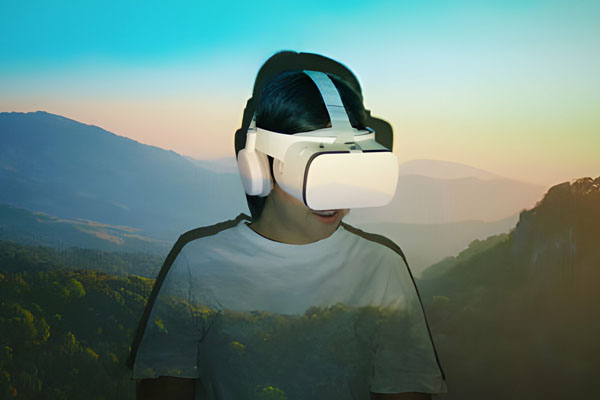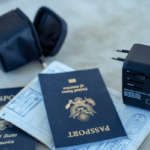Exploring the world becomes easier with AI in travel planning. This article delves into how artificial intelligence is transforming our travel experiences, making adventures more personalized and efficient.
AIs Role in Personalizing Journeys
AI reshapes travel planning, offering tailored experiences. It analyzes preferences, suggesting destinations aligning with individual tastes. AI tools process vast data, identifying ideal travel times and accommodations. This personalization ensures trips resonate more with travelers, enhancing overall satisfaction. The technologys ability to understand subtle preferences marks a significant evolution in how we plan and experience our travels, making it a cornerstone of modern-day explorations.
Moreover, AI streamlines booking processes. It compares prices, finds deals, and books flights and hotels effortlessly. AI chatbots provide instant support, answering queries and offering recommendations. This convenience saves time, reducing the stress often associated with travel preparations. AIs efficiency in handling these details allows travelers to focus on the excitement of the journey ahead, rather than getting bogged down in logistics and planning.
AI also enhances safety during travels. It provides real-time updates on weather, political climates, and health advisories. This information is crucial for making informed decisions while abroad. Furthermore, AI-powered tools can learn from travel patterns, offering insights for future trips. This continuous learning aspect of AI ensures each journey is more refined than the last, making travel planning a dynamic and ever-improving process.
Enhancing Travel Efficiency with AI

Artificial intelligence significantly enhances travel efficiency. AI algorithms optimize itineraries, considering factors like distance, cost, and personal interests. This optimization leads to time and cost savings, allowing travelers to enjoy more experiences within their budget. Additionally, AIs capability to predict traffic and suggest the best routes minimizes delays, ensuring a smooth travel experience. The integration of AI in travel planning signifies a leap towards more efficient and hassle-free journeys.
AIs impact extends to language barriers, easing global travel. Translation apps powered by AI offer real-time, accurate translations, fostering better communication with locals. This technology breaks down language barriers, enriching the travel experience by enabling deeper cultural immersion. Furthermore, AI-driven recommendation engines suggest local experiences, restaurants, and attractions, based on traveler reviews and preferences, offering a more authentic and personalized exploration of new destinations.
In the realm of sustainability, AI plays a pivotal role. It suggests eco-friendly travel options, promoting responsible tourism. By analyzing environmental data, AI aids in planning trips that minimize carbon footprints, such as recommending public transportation or eco-friendly accommodations. This conscious approach to travel, powered by AI, aligns with the growing trend of sustainable tourism, allowing travelers to enjoy the world while preserving it for future generations.
AI in Travel Planning: A Game Changer
The integration of AI in travel planning extends to emergency assistance. AI systems monitor global events, providing timely alerts on issues like natural disasters or political unrest. This proactive approach ensures traveler safety, offering peace of mind. Additionally, AI-driven apps can guide travelers to the nearest hospitals or embassies in case of emergencies. This level of instantaneous support and guidance is unprecedented, illustrating AIs transformative role in making travel safer and more secure.
AI also revolutionizes budget planning for trips. By analyzing historical and current pricing data, AI predicts future travel costs, aiding in budget allocation. This foresight allows travelers to make cost-effective decisions, such as booking flights or hotels at optimal times. Moreover, AI personal finance tools help manage expenses during trips, ensuring travelers stay within budget. This financial aspect of AI in travel planning is crucial for a stress-free and enjoyable journey.
Finally, AI contributes to creating memorable travel experiences. By analyzing past trips and reviews, AI suggests activities and destinations that align with travelers preferences. These personalized recommendations ensure each trip is unique and tailored to individual interests. Additionally, AI-powered cameras and apps enhance travel memories by suggesting the best photo spots or creating digital travel diaries. This personal touch adds immense value to travel, making each journey unforgettable.
AIs Impact on Cultural Exploration
AI significantly influences cultural exploration during travel. By analyzing local customs and traditions, AI offers insights into cultural etiquette, enhancing interactions with locals. This knowledge deepens the travel experience, fostering respect and understanding of different cultures. Furthermore, AI-curated cultural tours, based on historical and artistic interests, provide a more immersive experience. These AI-driven cultural insights ensure travelers not only visit a place but also connect meaningfully with its essence.
Additionally, AI plays a crucial role in culinary adventures. AI-driven apps recommend local dining experiences based on taste preferences and dietary restrictions, ensuring a delightful culinary journey. These recommendations often include hidden gems and local favorites, offering an authentic taste of the destination. The ability of AI to personalize dining experiences according to individual tastes transforms eating out while traveling into a culinary adventure tailored to each travelers palate.
AI also enhances the travel experience through virtual reality (VR) and augmented reality (AR). These technologies offer virtual tours of destinations before visiting, aiding in decision-making. During trips, AR apps provide interactive information about landmarks and historical sites, enriching the sightseeing experience. This blend of reality and digital innovation, powered by AI, adds a new dimension to travel, making it more engaging and informative.
Streamlining Logistics with AI in Travel

AI revolutionizes logistics in travel, simplifying complex planning. It assists in packing by suggesting items based on destination, weather, and activities. Moreover, AI helps in organizing travel documents, ensuring everything is in order for a hassle-free journey. The capability of AI to manage these logistical details relieves travelers from the burden of minutiae, allowing them to focus on the excitement of their upcoming adventures and explore with ease and confidence.
In transportation, AIs impact is profound. AI-powered apps provide real-time updates on public transit, flight delays, and traffic conditions. This information is invaluable for efficient travel, minimizing disruptions and maximizing enjoyment. For road trips, AI suggests the best routes and stops, making the journey as enjoyable as the destination. These AI-driven transportation solutions ensure smooth transit, enhancing the overall travel experience by reducing uncertainty and stress.
The influence of AI in travel extends to accommodation selection. AI tools analyze reviews and preferences to recommend the best lodging options, from hotels to unique local stays. This personalized approach ensures travelers find accommodations that suit their style and budget. Additionally, AI-enhanced security features in hotels, like facial recognition for check-ins, enhance safety and convenience. The role of AI in choosing and securing accommodations marks a significant advancement in travel planning.
AI Enhancing Adventure and Leisure Travel
AI transforms adventure and leisure travel by offering tailored activity suggestions. Whether its adrenaline-packed adventures or serene relaxation spots, AIs predictive analytics cater to individual preferences. For thrill-seekers, AI suggests activities like skydiving or scuba diving locations, based on past experiences and safety records. For those seeking relaxation, AI recommends serene beaches or wellness retreats. This customization ensures every traveler finds activities that resonate with their definition of adventure and leisure.
In outdoor exploration, AI aids in trail mapping and weather forecasting, ensuring safe and enjoyable hiking or camping experiences. It suggests trails based on difficulty, scenery, and user reviews. For wildlife enthusiasts, AI-driven apps identify local wildlife and provide detailed information, enhancing the connection with nature. These AI tools not only ensure safety and preparedness but also enrich the outdoor experience by providing insights and recommendations tailored to the travelers interests.
In leisure travel, AI contributes to relaxation and rejuvenation. Spa and wellness recommendations are personalized using AI, aligning with individual health and relaxation needs. For those seeking cultural leisure, AI recommends local arts, theater, and music events, ensuring engagement with the local cultural scene. These AI-driven leisure recommendations transform vacation time into a truly rejuvenating and culturally enriching experience, tailored precisely to what the traveler seeks in their leisure time.
AI Tailoring Unique Family Travel Experiences
AI revolutionizes family travel planning by offering personalized experiences for all ages. It suggests family-friendly destinations, accommodations, and activities, considering the interests and needs of children and adults alike. From theme parks to educational museums, AI helps in crafting itineraries that engage and entertain the whole family. This customization ensures that family trips are not just vacations, but enriching experiences that cater to the interests and enjoyment of each family member.
Additionally, AI aids in managing family travel logistics seamlessly. From coordinating flight schedules for multiple people to booking family-sized accommodations, AI streamlines these processes, making planning stress-free. AI also suggests family dining options that cater to various dietary preferences and restrictions, ensuring enjoyable meal times for everyone. This logistical ease provided by AI in family travel planning allows families to focus on creating lasting memories together, rather than on the details of travel coordination.
AIs role in educational travel for families is significant. It offers interactive learning experiences at destinations, like augmented reality tours of historical sites or science museums. These educational tools make learning fun and engaging for children, adding an informative layer to the travel experience. By integrating education into travel, AI ensures that family trips are not only enjoyable but also enriching, offering opportunities for learning and exploration that extend beyond the traditional classroom setting.
AI in Travel Planning: Simplifying Group Journeys
AI plays a crucial role in simplifying group travel planning. It coordinates schedules and preferences for multiple people, ensuring a harmonious trip. AI tools can suggest destinations, accommodations, and activities that cater to the varied interests of a group, balancing individual preferences with group dynamics. This ability to streamline group decision-making alleviates the typical challenges of organizing group trips, allowing everyone to focus more on enjoying the journey together and less on the complexities of planning.
For corporate travel, AIs efficiency is invaluable. It assists in organizing business meetings, conferences, and team-building retreats, considering factors like location accessibility, facilities, and budget. AI tools can book flights and accommodations for large groups, keeping track of each members travel details. This organizational prowess of AI in group and corporate travel planning ensures smooth, efficient trips, allowing businesses to focus on their objectives without the logistical headaches.
AI also enhances the social aspect of group travel. It recommends group activities and experiences that foster bonding and teamwork. Whether its a cooking class in Italy or a safari adventure in Africa, AI ensures that group activities are engaging and suitable for all participants. This focus on social dynamics in travel planning, powered by AI, helps create memorable group experiences that strengthen relationships and enhance the joy of shared adventures.
AIs Role in Eco-Conscious Travel Choices
AI significantly contributes to eco-conscious travel planning. It identifies eco-friendly travel options, like sustainable accommodations and low-carbon transportation methods, aligning with travelers environmental values. AI analyzes environmental impacts, suggesting itineraries that minimize ecological footprints. This approach promotes sustainable tourism, allowing travelers to explore the world responsibly. The integration of AI in making eco-conscious choices reflects a growing trend towards responsible travel, ensuring that our wanderlust doesnt come at the expense of the planets well-being.
Furthermore, AI aids in wildlife conservation efforts during travel. AI-driven apps provide information on ethical wildlife interactions, ensuring that animal encounters are respectful and non-intrusive. This guidance is crucial for preserving natural habitats and supporting conservation efforts. AI also suggests eco-tours that contribute to local conservation initiatives, offering travelers an opportunity to support environmental causes while exploring. This blend of AI and eco-conscious travel enriches the travel experience, making it more meaningful and impactful.
AIs influence in sustainable travel extends to local community support. It recommends local businesses and community-based tourism initiatives, ensuring that travel spending benefits local economies. By promoting locally owned restaurants, accommodations, and tour operators, AI helps in distributing tourism revenue more evenly and ethically. This support for local communities, enabled by AI, fosters a more authentic and responsible travel experience, where travelers can give back to the destinations they visit.
Leveraging AI for Seamless Travel Experiences
AIs ability to leverage big data transforms travel into seamless experiences. It predicts and mitigates potential travel disruptions, like flight cancellations or hotel overbookings. By proactively addressing these issues, AI ensures a smoother journey. Additionally, AI personalizes travel insurance options, providing coverage tailored to each trips specific needs. This level of customization in handling unforeseen travel complications exemplifies AIs role in creating stress-free travel experiences, allowing travelers to enjoy their journey with peace of mind.
AIs integration in travel apps also offers seamless navigation and exploration. From providing city maps to suggesting the best local transport options, AI ensures easy and efficient exploration of new places. These AI-driven travel tools are particularly beneficial in unfamiliar destinations, offering guidance and reassurance. This ease of navigation, facilitated by AI, allows travelers to immerse themselves fully in their surroundings, exploring with confidence and ease.
In conclusion, AI in travel planning doesnt just simplify logistics; it enriches the entire travel experience. From personalized recommendations to efficient logistics management, AI is a game-changer in the travel industry. Its role in enhancing safety, promoting sustainability, and ensuring enjoyable experiences is undeniable. As AI continues to evolve, its impact on travel will only grow, promising even more innovative and tailored travel experiences in the future.
Conclusion
In summary, AI in travel planning has revolutionized how we explore the world. It offers personalized, efficient, and safer travel experiences, adapting to individual preferences and needs. From simplifying logistics to enhancing travel experiences, AIs role is indispensable in modern travel. It bridges gaps between cultures, simplifies complex planning, and even advocates for responsible tourism. The future of travel, powered by AI, looks not only more convenient but also more connected and conscious.
This evolution in travel planning underscores the significance of technology in our daily lives. AIs ability to analyze vast amounts of data and provide actionable insights has transformed travel from a task-laden process into an enjoyable and enriching experience. Its a testament to how technology can be harnessed for practical, enjoyable, and sustainable purposes, enhancing not just travel experiences but also the quality of our global interactions and understanding.
As we continue to embrace AI in travel planning, we open doors to more personalized, immersive, and meaningful journeys. The potential for AI to further innovate and streamline the travel industry is immense, promising even more advanced and user-friendly travel tools in the future. Embracing this technological evolution will undoubtedly lead to more memorable, enjoyable, and impactful travel experiences for adventurers around the world.
I. Frenquently Asked Questions About France

Ryan Taylor, a seasoned traveler with over a decade of experience exploring Europe’s nooks and crannies, offers a wealth of knowledge and unique insights into the continent’s diverse cultures and landscapes. His passion for travel began in his early twenties, and since then, Ryan has journeyed through numerous European countries, collecting stories, tips, and a deep understanding of each destination’s unique charm. His blog entries are not just guides but narratives enriched with personal experiences, making every recommendation and piece of advice relatable and practical for fellow travel enthusiasts. With a keen eye for hidden gems and a love for sharing his adventures, Ryan’s writings are a treasure trove for anyone seeking to discover the beauty and richness of Europe.







